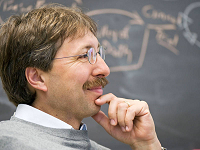 |
| TUM's Dirk Busch |
About two years ago, adoptive T-cell therapies captured the attention of the R&D world with the initial round of dramatic results in fighting blood cancers. But even before that first wave of CAR-T drugs makes it to the market, some of the leading scientists in the field have been doing some extensive tinkering with the technology. And over the long weekend, several of the top CAR-T scientists in the world laid out fresh human and animal data indicating their progress in increasing the potency of the treatment while extending the durability of these drugs and potentially dialing down the threat of severe side effects.
This new work could play a particularly important role at Juno Therapeutics ($JUNO), the Seattle-based biotech that helped ignite tremendous excitement for the science with close ties to a range of leading cancer R&D institutions, which both acquired a key spinout less than a year ago and also funded the work on display over the weekend.
The autologous CAR-T approach that relies on patient cells is simple and broadly understood. After extracting T cells from patients, they're re-engineered with a chimeric antigen receptor so they can grapple with cancer cells. Juno, Kite Pharma ($KITE) and Novartis ($NVS) have all demonstrated in small studies just how effective an antigen-activated approach can be in fighting blood cancers, while staring down some tough obstacles in applying the same approach to solid tumors.
Dirk Busch from the Technical University of Munich, Chiara Bonini of the San Raffaele Scientific Institute in Milan, and Stanley Riddell of the Fred Hutchinson Cancer Research Center, though, managed to captivate an audience at the annual meeting of the American Association for the Advancement of Science with an update on their work.
They wanted to find a subset of T cells that offered the best prospects for a durable response that could last years with lower doses that could hopefully be used without the life-threatening instances of cytokine release syndrome that has limited the use of this approach.
These scientists captivated their audience with evidence that memory T cells are among the best candidates for the job.
"What we bring into the game is, first, the conviction that you have to select the right cells to generate optimal cell products for therapy, together with superior techniques to do it," noted TUM's Busch. "Over the past years, we at TUM as well as Stan Riddell and Chiara Bonini have worked on providing cell products that will upon transfer to patients expand to large numbers and stay active for a long time, potentially life-long. We identified a subset of T cells with high regenerative potential, where even low numbers of transferred cells--in the extreme a single T cell--can confer therapeutic immune responses."
In a small group of dying, late-stage patients given just months to live, this approach eliminated symptoms of acute lymphoblastic leukemia in 94% of the group. Patients with a variety of blood cancers saw an 80% response rate.
"This is unprecedented in medicine, to be honest, to get response rates in this range in these very advanced patients," Riddell told reporters at the meeting.
"This is really a revolution," Bonini added, according to The Guardian. "T cells are a living drug, and in particular they have the potential to persist in our body for our whole lives."
Juno has been paying close attention to these developments. Last May, the biotech acquired a spinout from TUM, Stage Cell Therapeutics, in a deal worth up to $233 million. And Juno also funded the work at the Hutch, which has been allied with the biotech from its launch date.
This won't be the last word on the subject, or anything close to it. Cellectis ($CLLS) has been pioneering an off-the-shelf approach to CAR-T that threatens to topple any autologous entry onto the market. Pfizer ($PFE) and Servier are now following up with their own human studies after the Paris-based biotech was able to use its technology successfully in a compassionate use case.
- here's the release